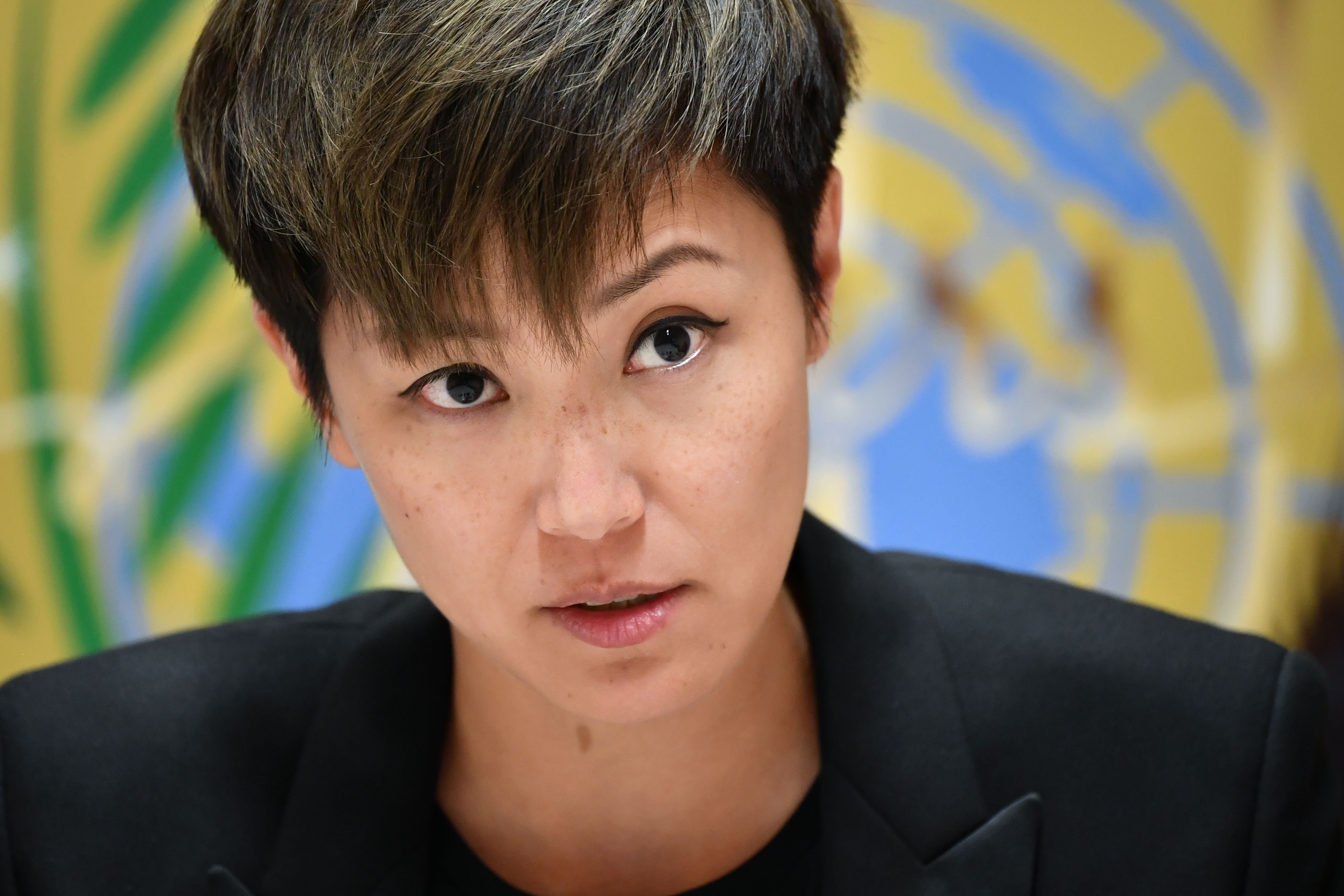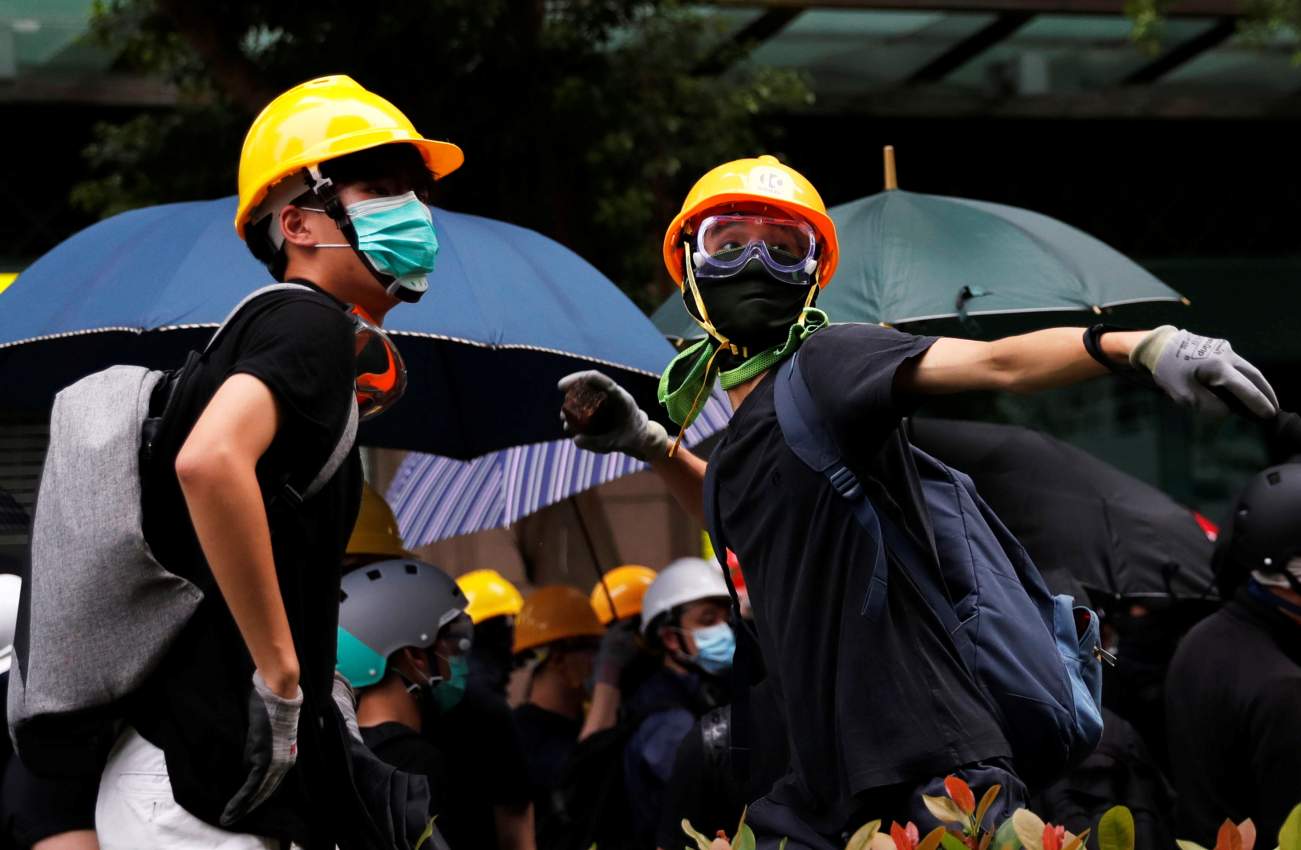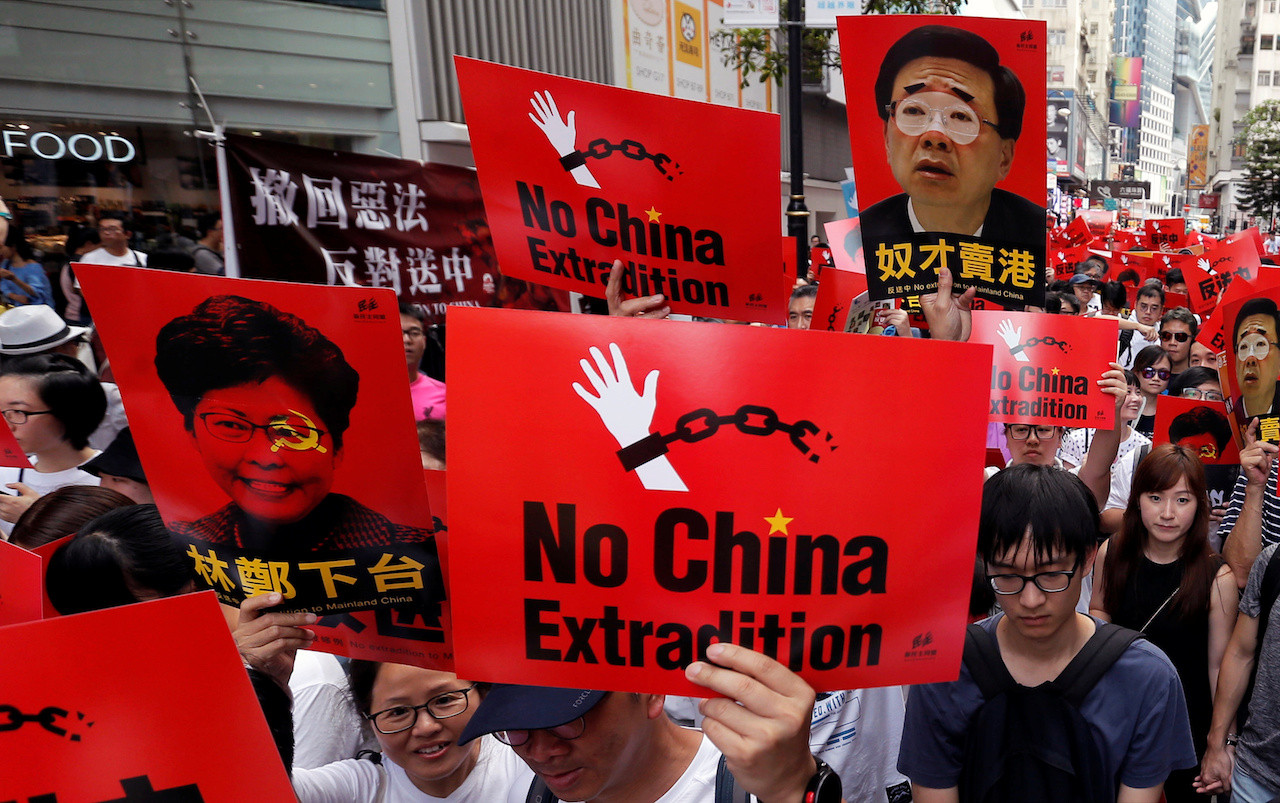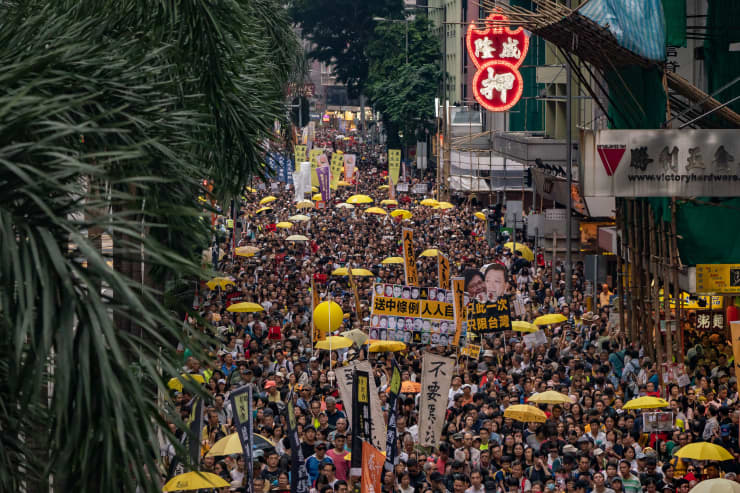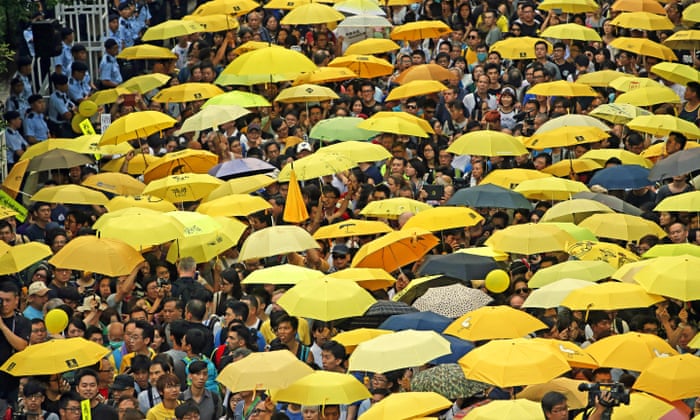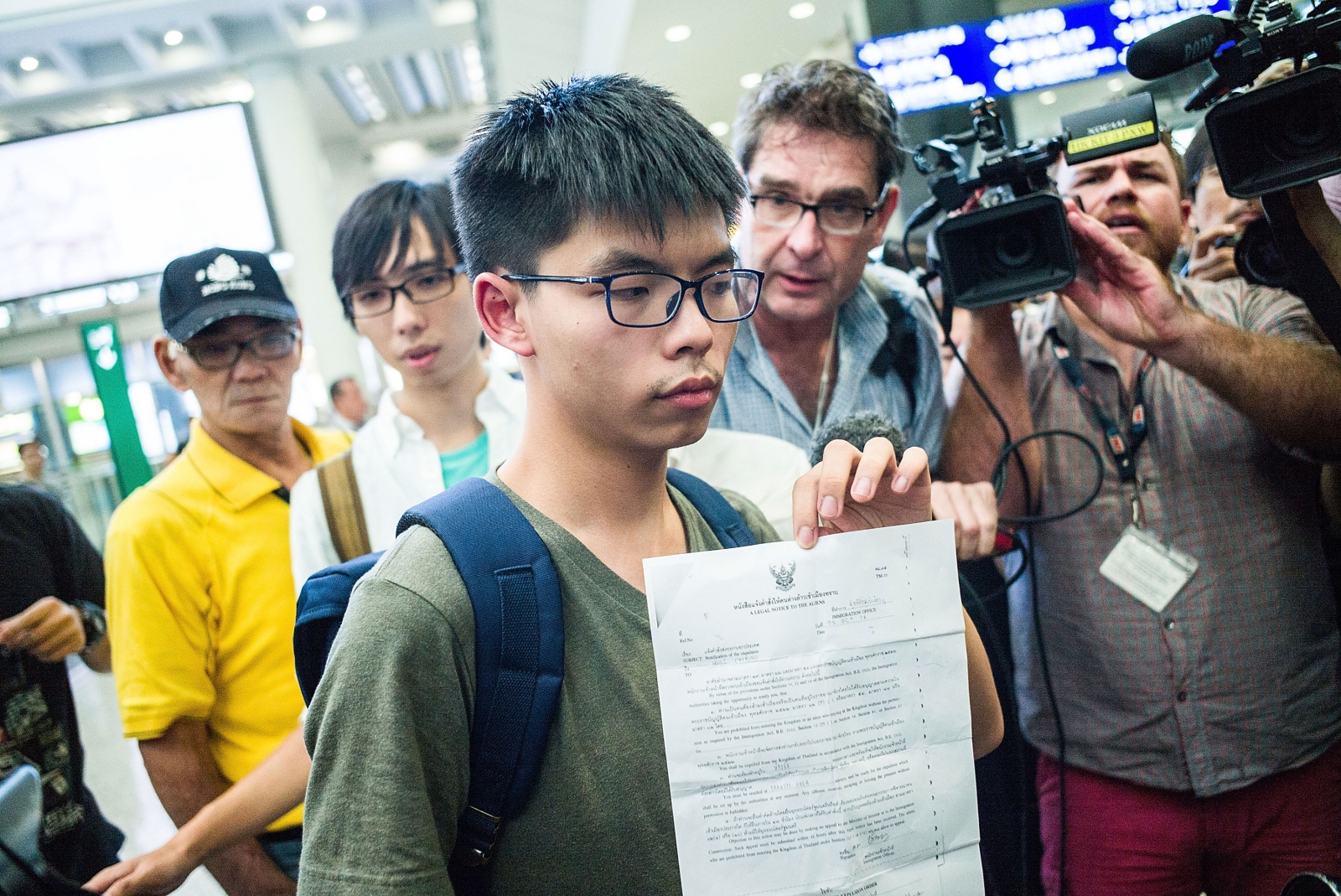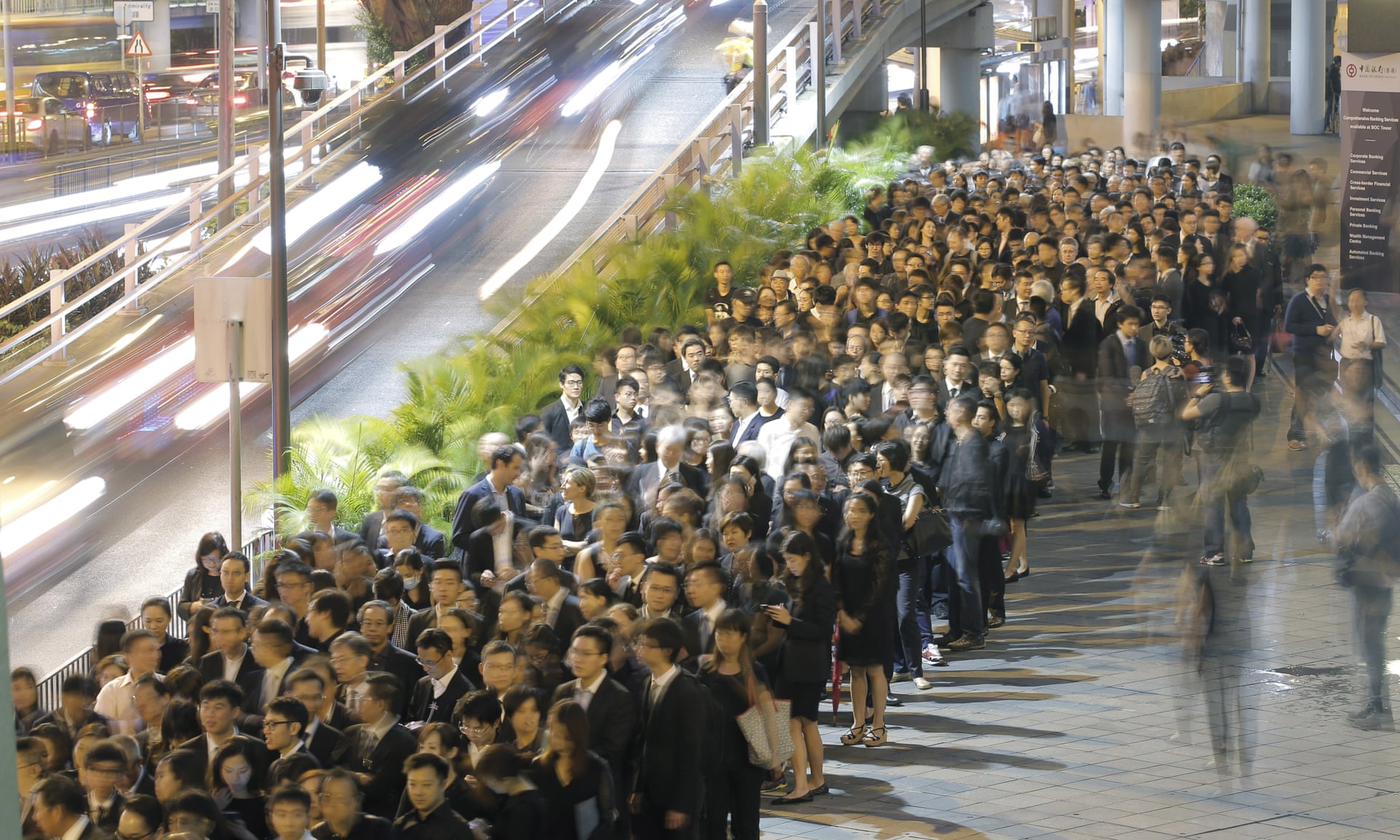By Ben Domenech
On a gray, humid day in June, a 35-year-old man named Marco Leung climbed atop a platform on elevated scaffolding outside the ritzy complex known as Pacific Place in the Admiralty district of Hong Kong, and announced he was tired of being ignored.
He wore a bright yellow raincoat festooned with slogans — in the days to come, Hong Kong protesters would brand him “Raincoat Man” — and he unfurled a lengthy sign saying in English and Chinese: “No extradition to China, total withdrawal of the extradition bill, we are not rioters, release the students and injured, Carrie Lam step down, help Hong Kong.”
In the hours to come, police and firefighters would swarm the area.
In the hours to come, police and firefighters would swarm the area.
Negotiators attempted to convince him to come down, but he refused.
Firefighters ended up confronting Leung, who, after climbing away from them outside the railings, fell about 60 feet to his death, missing an inflated police cushion.
It was branded a suicide, the first of eight since the Hong Kong protests began, though the macabre footage doesn’t really bear that out.
Leung was no radical, at least until recently.
Leung was no radical, at least until recently.
He had previously indicated support of the Hong Kong Federation of Trade Unions, an establishment group, and backed establishment candidates on social media as recently as 2016.
He backed Wong Kwok-hing, among others, who lost his seat to the more aggressively pro-democracy Roy Kwong — a Democracy Party legislator who was at Leung’s protest that day, urging him to come down safely.
The police declined to let Kwong participate — so he crossed the road and used a loudspeaker instead, ultimately to no avail.

Ray Chan
✔@ray_slowbeat
My colleague Roy Kwong has done his best to prevent tragedies & abuses. As butcher Carrie Lam's regime remains in power, sad events including the loss of life are bound to happen. This Gov't and its enablers must be made accountable for their fascist politics. #HongKongProtests

211
5:22 PM - Jun 15, 2019 · Hong Kong
After his death, Leung’s parents spoke out through a friend, urging on the young people of Hong Kong.
“Every brave citizen who takes to the street is doing so because they love Hong Kong deeply. Only by protecting themselves and staying alive can young people continue to speak up bravely against social injustices.”
The location Leung chose indicates the way the Hong Kong protesters cut across lines of culture and class.
While a “V for Vendetta” slogan is spray-painted a stone’s throw from where he hit the ground — “People shouldn’t be afraid of their government, governments should be afraid of their people” — this is no class uprising.
It is instead a broad cross-section of Hong Kong’s 7 million citizens who are joining in: blue and white collar, those of wealth and middle class, sons and daughters delaying their college education to join in.
At the luxuriant lounge in the JW Marriott, housed within the Pacific Place complex, about a hundred American dollars buys entry to a buffet of endless caviar, seared foie gras, lobster thermidor, fresh langoustines, mussels, crab legs, shrimp dumplings, lamb pops, roasted beef and pork, roasted squab, sushi, fruits and cheeses of all manner, four kinds of aged ham, three kinds of smoked salmon, bespoke Asian noodle dishes, and bottomless wine and champagne.
The tourists are mostly from the mainland: The men wear “Avengers” T-shirts and drawstring shorts with Nikes, while the women dress in shimmering summer blouses and flowing skirts with ankle boots.
Upper-middle-class people gorge while the middle class goes for an esteemed mother’s birthday.
She loves her gift of Italian perfume from the mega complex beneath us, five floors of an adult playground of shopping and excess that rivals any high-end American mega mall.
All the brands are there, though a group of college-aged girls express disappointed sounds outside the Celine store that is not yet open.
The doors are where you notice it first.
The heavy metal door hangings are bound in multiple ways, M-shaped locks paired with chains and padlocks, plus sandbags and interlocked metal barriers at other entrances.
It creates mazes where shoppers have to backtrack and ride the same escalator twice.
When you do the circuit, it’s easy to spot the choke points.
That’s where you’ll find men in suits who look tired and hold radios or have earbuds, wearing sunglasses, always watchful.
This is the same complex where just a few months ago, Leung would be the first death in a series of protests that would rock Hong Kong.
Over the course of the past 19 weeks, protesters have taken to the streets all over the city.
They have engaged in all manner of behavior.
Several of them have died, all reportedly by suicide.
Not all the protesters believe that’s the real reason.
But others claim the despair is so great among the youths of the city that suicide is very predictable.
When you talk to the people who are behind the democracy movement, to the protesters and the organizers and the organizer-adjacent, you can view the motives that have animated the streets for the past 19-plus weeks as existing within a broader context of conflict over autonomy and self-determination.
If you are a young Hong Konger, in your late 20s to early 30s, you remember the past before the handoff.
You are mindful of the years when Hong Kong had a higher degree of autonomy that would presumably be protected.
You see what you are losing in the current moment — and that’s what makes you take to the streets.
The current protests are being framed by the West as the first in Hong Kong in the era of comprehensive digital media and social communication that can bypass the restrictions of the state. That’s true to an extent — much of what’s happened in the past weeks here has focused on that audience.
But what separates this from the past, such as the Umbrella Revolution, is that the whole city is all in on this, existentially, regardless of class divide.
This despite the wishful thinking of the likes of Russia Today, the propaganda network of Vladimir Putin, which compared the protesters to classist uprisers from the film series “The Purge,” splicing clips together between the violent American movie and the acts of protesters in the city.
That level of deadly violence, as waged by the protesters, is absent, but there is violence nonetheless — petrol fire bombs, sharp objects, and vandalism abound.
Graffiti is omnipresent, but painted over lazily, as if the cleaners know that they will be back to do the same task again the next morning.
The city does not feel like a powder keg — more like a solid pot that looks safe and cool to the touch, but inside hides a roiling boil that will burn you in an instant.
Hawley’s Night with Hong Kong Protesters
The night one policeman’s neck was slashed, Sen. Josh Hawley, freshman Republican from Missouri, was in the streets with the protesters, bearing witness to their actions and the response of the police.
A white Kia emblazoned with graffiti, smashed and broken open with its contents spilled on the ground, was a short half-block from the main street.
According to protesters, the occupant inside had presented himself as a journalist, but was in reality a cop embedded within the movement.
Whether true or not, the protesters had exacted their revenge on his vehicle, cracking it open like an egg and feathering it with fliers and leaflets.
After a few minutes of press attention, clad in yellow jackets, streaming in a multitude of languages, holding up their various electronic devices in the spitting rain, came the sound of shouts that in any language reveal the the oncoming threat of Five-O.
“Be Water” is the mantra of the protesters now — a reference to their own Bruce Lee, who said, “Be like water making its way through cracks. Do not be assertive, but adjust to the object, and you shall find a way around or through it.”
Instead of seeking physical confrontation with the cops, now they flow away from the high ground in all directions, and regroup.
The cops roll in en masse, prompting a scurry of masked individuals from the scene.
They run in all directions as bus after bus unloads masked police officers, clad in armor and bulky gear, wielding large shields and bellowing orders.
They surround the scene and push back anyone in the area, blocking the nearby intersection.
They carry tear gas guns and batons, with no identifying badge numbers, and if you try to take their picture even of their glaring eyes, they unleash a torrent of epilepsy-inducing strobe lights.
Hawley, a slim athletic man who looks more like a health nut executive than a senator, loped through the cross streets, standing head and shoulders above the crowd, talking variously with protesters and with press, taking pictures on his own phone to share with the Western world.
His staff had to work to pull him away from the scene, even when the loudspeakers are ordering crowds to disperse.
The protesters and organizers know who Hawley is, and some even mention that he is the youngest senator.
It is a funny thing to hear Hong Kong twentysomethings with a greater knowledge of American civics than the average U.S. voter — especially when they query about subcommittee hearings and unanimous consent.
The interest of the protest-adjacent leadership is in the passage of the Hong Kong Human Rights and Democracy Act — authored originally by Marco Rubio, with more than 30 bipartisan co-sponsors.
Whether it would result in meaningful impact on Hong Kong’s situation or not, it would be a signal to Hong Kong and Beijing and other nations as well about the way these protests are perceived.
An older woman, unmasked and barefoot, wearing a flowery orange and pink dress, stands on the corner of the intersection, letting the police have it.
A call and response develops between the different corners as members of the press crowd around the woman.
The protesters are not throwing anything at the police or engaging in physical action, but they are daring them to do what they have seen them do for weeks: to beat the citizens they are supposed to protect, not for doing anything wrong, but for the things they dare to say.
Everyone is waiting for something to break.
This time, the cops hold back.
They know the next 24 hours will potentially bring an even bigger demonstration, and don’t want to make another martyr on the eve of a public spectacle.
They set about clearing the makeshift barricade protesters had arranged — a rather impressive mix of trash cans, traffic signs, concrete, and rebar.
Well-dressed shopkeepers along the main drag peer through metal slats they bring down whenever the sirens draw near.
In between the stores and shops, the graffiti blanketing wooden barriers alternates between Cantonese and English, expressing all manner of viewpoints — but all anti-cop.
Some words indicated the cops were working hand in glove with the local Triads criminal operation, something that has been accused multiple times.
Others focused more blatantly on the mainland, including one saying, “Pooh is watching,” Winnie the Pooh being a stand-in for Dictator Xi.
Recently, a particularly enterprising protester set up a broadcast allowing for the “South Park” episode “Band in China” featuring just that reference to be displayed after it was, well, banned in China.
These are the types of tactics these young, technologically adept and passionate protesters are engaged in.
A strobe light from an anonymous cop’s shoulder doesn’t really stand a chance against it.
In the morning, Hawley will describe the scene in Hong Kong to the Western press as a “police state” — prompting Hong Kong’s chief politician Carrie Lam to disagree.
It is hard to see how he is wrong.

Josh Hawley
✔@HawleyMO
I chose the words “police state” purposely - because that is exactly what Hong Kong is becoming. I saw it myself. If Carrie Lam wants to demonstrate otherwise, here’s an idea: resign https://twitter.com/tictoc/status/1183935160707764225 …
Bloomberg TicToc
✔@tictoc

 "To describe Hong Kong as a police state is totally unfounded."
"To describe Hong Kong as a police state is totally unfounded."
Leader Carrie Lam says U.S. senators visiting Hong Kong have preconceived views about the city. Senators Josh Hawley, Ted Cruz and Rick Scott have visited the city since the #HongKongProtests #香港
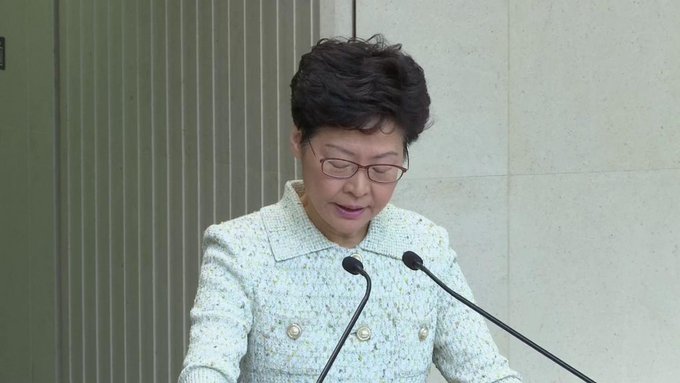
23.7K
5:31 AM - Oct 15, 2019
American Response and Corporate Censorship
In recent weeks, this story took on new life in America and the West thanks to some odd flashpoints. For America, much of it was focused on the issue of the National Basketball Association.
The NBA has an extreme foothold here — 17 percent of its revenue comes from China, and it had the misfortune this month to discover that this Hong Kong issue was creeping into the overall tour that was going on promoting the basketball association in China, featuring some of its biggest stars.
After Houston Rockets general manager Daryl Morey had the audacity to retweet an image meme supporting freedom in Hong Kong, the Chinese flipped, and Americans flipped even more when they saw how quickly various "woke" athletes and administrators in the NBA, who have made politics a centerpiece of their appeal in recent years, were willing to bend the knee to the Chinese communists.
The most recent was LeBron James, whose cowardly comments trended on Twitter hours after the massive protests took over Hong Kong streets again.
James called for Morey to educate himself.
Well, we’re all in need of a good re-education, from time to time.

Ben Domenech
✔@bdomenech
This was the Top Tweet I saw as I switched from my burner after three days in Hong Kong among the protesters.
Look into the eyes of a young Hong Konger who has seen her friends beaten and imprisoned and spout this bullshit.
I have never hated LeBron until this instant. https://twitter.com/BenGolliver/status/1183917743680020480 …
Ben Golliver
✔@BenGolliver
Lakers’ LeBron James on NBA’s China controversy: “I don’t want to get into a ... feud with Daryl Morey but I believe he wasn’t educated on the situation at hand and he spoke.”
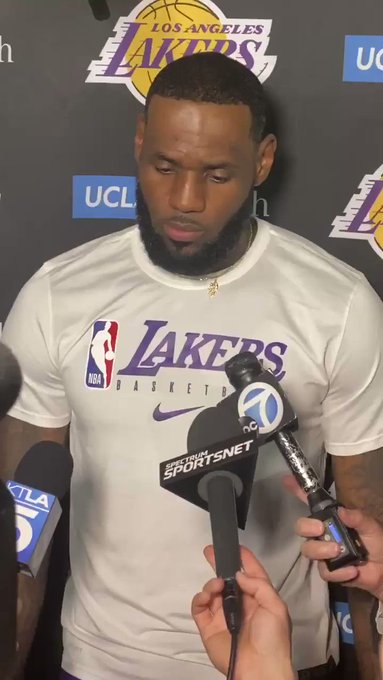
5,592
5:15 AM - Oct 15, 2019
In the category of video games, an outburst from a gamer within the Blizzard universe led to crackdowns and apologies that rocketed around a world of advanced E-gamers who have become far more popular than ever before, even rivaling great physical athletes.
Protesters also saw the bending of the knee from other corporations, such as Apple, which deleted the HKmap.live app being used by some protesters to track the activities of police in Hong Kong.
But it was hardly their only app.
In Hong Kong, it’s understood that not everyone can take the black or wear a mask.
For their part, the white-collar protesters are doing their best to hide.
They are canceling their own social media accounts.
They are trying to prevent themselves from being connected to their businesses for any political expressions.
They are worried about the accountability and the enforcement mechanisms used by authoritarian regimes that can control the access to billions of potential customers.
But they still are showing up to the protests, such as those on Monday that clogged the streets with peaceful demonstrators.
Meanwhile, the police union has asked for permission to fire at will on protesters who use various implements:
Authorities have already loosened guidelines on the use of force by police, according to documents seen by Reuters on Thursday, as they struggle to stamp out anti-government protests that have rocked Hong Kong for nearly four months.
The loosening of restrictions on the use of force by police came into effect just before some of the most violent turmoil yet at protests on Tuesday, when a teenaged secondary school student was shot by an officer in the chest and wounded — the first time a demonstrator had been hit by live fire. …
Local media Now TV and Cable TV reported the changes to the police procedures manual took effect on Sept. 30, the day before Tuesday’s violence at widespread protests on China’s National Day, during which the student was shot. …
The updated guidelines also removed a line that said “officers will be accountable for their own actions”, stating only that “officers on the ground should exercise their own discretion to determine what level of force is justified in a given situation”.
Police have shot one protester already with live ammunition.
The protesters expect there will be more.
On the mainland, the focus has been on economic policy and welfare, and Carrie Lam would like to stick to that.
But in reality, these protests are about a lot more than that.
They are about the future of a Hong Kong that many people see as slipping away, one that young people in particular fear they are losing.
The protests started with concerns that the extradition law would mean the end of Hong Kong as they know it.
Now, it’s about something much bigger.
After multiple incidents where the cops are seen as having whitewashed the facts, they have lost the assumption among the citizenry that they are telling the truth.
Already, political activists are fleeing to other countries.
Elderly groups who attempt to protect the children have already incited police incidents.
Religious freedom concerns are rising, particularly about the Chinese state wanting to set up boards to infiltrate and alter those assumptions of religious schools.
The crackdown on free internet is constantly feared.
A government official who was asked about this on the radio recently was quoted as saying, “Never say never.”
This Hong Kong Protest Is Different From the Past
This is not the first era of protest in Hong Kong since the handover in 1997.
Previous protests, such as the Umbrella Revolution, were overwhelmingly peaceful, but there is now a feeling that a peaceful approach has not been effective, particularly in an era in which police appear ready to engage in escalating levels of violence.
For years, pro-democracy advocates who feared that Beijing would crack down on the city system they know and love restrained themselves, participating almost exclusively in nonviolent protest. They would march with permits, organize under the existing law, and generally not buck the system they inhabit.
This feels different.
Joshua Wong, a student activist who was at the center of both Umbrella and other protests in the past, who was standing in jail when he saw the nearly 2 million people come out to protest peacefully in the streets back in July, is concerned that this is a moment in which Hong Kong could see its autonomy seriously slip away, based not just on its own situation but on the international priorities of Dictator Xi.
These are the sorts of concerns echoed by Texas Sen. Ted Cruz.
Wearing all black in sympathy for the protesters, he visited key figures in Hong Kong this past week and spoke to the West on “Face the Nation.”
A spokesman for Beijing reportedly said he would no longer be welcome in Hong Kong, something which Cruz may be likely to test in the future.
The use of excessive force is an underlying element of all of the protesters’ complaints.
Police remove gas masks from protesters who are trying to resist the tear gas the officers throw.
They use water cannons, tear gas, and rubber bullets.
They take gas masks even off journalists, and they arbitrarily arrest bystanders.
During the Umbrella protests, there were only eight arrests of cops for use of excessive force, stemming from two incidents.
And according to protester counts, in the past four months, the police in Hong Kong have deployed 3,000 gas canisters, compared to 89 during the entirety of the Umbrella protests.
The establishment on the island, made up of both politicians and tycoons who work within the financial sector, have largely favored what Beijing and the mainland has favored in recent years.
But the threat of an extradition law that would have rolled back the authority of Hong Kong to adjudicate criminal matters regarding its citizens proved a bridge too far.
Not wanting to displease the political authorities but wanting to maintain their authority, a few of these corporate citizens have broken from the rest of the herd.
Mainland China is not interested in such breakage.
It is demanding more and more the kind of fealty one would expect from an authoritarian regime.
Hong Kong Protesters Have Big Demands
The protesters have five demands — a series of issues they want to be at the centerpiece of the conversation over the next week as the Legislative Council meets for the first time since these protests began.
Carrie Lam, under siege politically and facing falling popularity, is set to give an agenda-setting speech, though it’s unclear whether security concerns will allow her to give it in person.
The mask ban is a key point of dispute here.
It attracted international attention recently, designed to crack down on the ability of protesters to keep their identities secret.
It was not a legislative action, but an executive one — a step undertaken outside the process.
Protesters fear it is a sign of what will come.
Rather than being motivated by independence, the protesters in Hong Kong are focused on the issue of autonomy — a form of autonomy they have experienced for decades.
They see within the expansion of Xi Jinping’s power the threat to that existence and to the one country, two systems approach.
These protests are more connected to other populist movements around the world, of the past and the present, than external observers have acknowledged.
It took over a year of open combat before the Americans gave up on their original aim of self-governance under the crown and went for independence in the 1700s.
Radicalization takes time, but when it comes, it comes in a torrent.
All around the world, people are tired of being governed by leaders who do not care how they vote. Hong Kong is joining them in this.
The possibility that the Hong Kong authorities will use colonial powers to suspend habeas corpus, defy the public will, and crack down in violent fashion on these protests is very real.
Wong predicts that protests will continue, regardless of what is done when the Legislative Council meets or when elections are held.
The fear is that Hong Kong is being turned into a police state beholden to Beijing, where these crackdowns are viewed as necessary to keep up appearances to the outside world.
But that is harder in an era of ever-present smartphones.
Beijing is primarily focused on containment.
It does not want to see the kind of protest happening in Hong Kong spread to other key cities under its regime, but there are other schools of thought as well.
If Beijing does let the unrest fester, it could be because Beijing sees the potential lesson for other citizens: Protests damage the economy, and it can say to others on the mainland, “See what happens when you want freedom and sovereignty?”
At the moment, it is mostly the mid-tier industries affected by these protests, tourism and the like. This is a real problem.
The malls are half-filled with the types of people who normally shop there.
New deals only do so much to offset the ever-present reminders.
What the protesters are demanding is big.
For one, universal suffrage: In the current system the powers that be, anointed by Beijing, are the ones who pick the candidates people can vote on.
Real universal suffrage would include the people’s ability to pick their own candidates for key positions.
For another, the rejection of the label “rioters,” one that carries with it a 10-year potential imprisonment.
And it is unlikely any of the protests will dissipate absent an independent commission looking into the police response.
For big demands like this, the peaceful protests of the past did not result in the kind of changes they wanted to achieve.
In July, almost a quarter of the island’s population came out to peacefully protest, and while that led to Carrie Lam’s decision to pull the extradition bill back, it did not lead to the kind of shifts those protesters really wanted to see, ones that would clearly indicate that the powerful had heard the complaints of the island citizenry over the encroaching reach of the mainland.
Instead, protesters are left to appeal to the international community.
Some are even hoping for the direction of sanctions under the Magnitsky Act, including severe economic sanctions against those found to have engaged in human rights abuses, freezing or seizing their assets and canceling their family visas to the West.
As the danger to autonomy increases, the response from Hong Kong’s citizenry becomes more strict and more aggressive.
The differences between past protests are clear.
This one is leaderless.
Leaderless movements are better, the protesters tell me, because they cannot be shut down just by arresting one person.
The protesters who have engaged in more violent activity, including the throwing of petrol bombs and the like, damaging property, and setting up barricades, have been branded by the media as radical. But the protest activists call them brave.
This is a matter the activists believe has been an increasing problem for the police force in Hong Kong.
The cops hide their badge numbers and their faces so they cannot be identified, and so even when protesters attempt to report the kind of brutality they readily experienced and for which there is a significant amount of video and photographic evidence, there is no way to attach those complaints to an actual officer.
Protesters say this is the worst they’ve ever seen it, that the government tactics are escalating.
They now risk violence eagerly and say the police complaint mechanism is broken, where anonymity prevents any useful accountability.
Protests are now being routinely redefined as inherently unlawful, where no permission is granted for the kind of peaceful exhibitions that had existed in the past, so there is no incentive to organize peacefully.
The police have lost credibility, and Hong Kong now has no safety valve.
In response, some within the protest movement have engaged in mob violence.
“Take care of it ourselves” is the mantra, including vigilante justice against those individuals the mob believes have engaged in behavior that hurts their cause.
Protesters Aren’t Giving Up
The Hong Kongers took the streets again on Monday night, with a specific focus on U.S. policy. There were hundreds of thousands of them, surrounding buildings, raising flags, singing songs.
There was no violence.
They were happy and optimistic, uninterested in violence.
They were trying to send a message.

Jessie Pang@JessiePang0125
Thousands of protesters rallied on Monday night to call for the support on the HK Human Rights and Democracy Act. It is also the first rally that obtained non-objection letter from the police since the #AntiMaskLaw is implemented. Yet, many still wear their masks tonight.
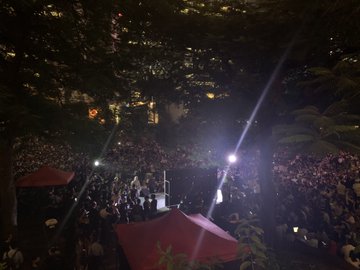
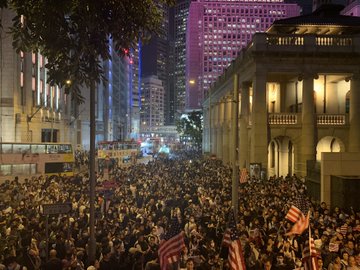
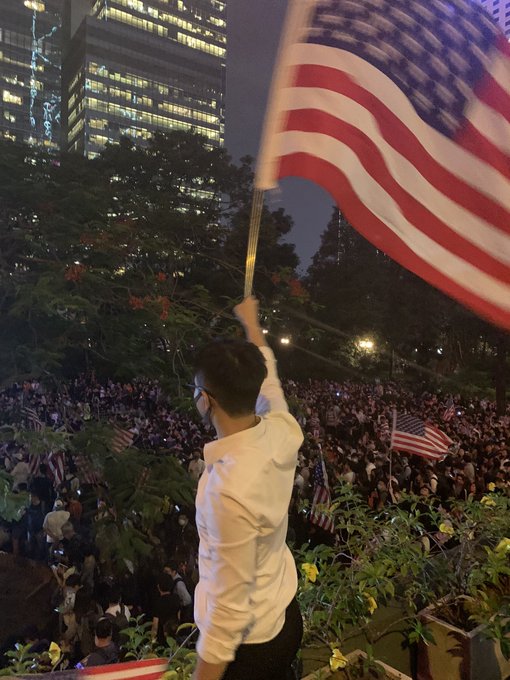
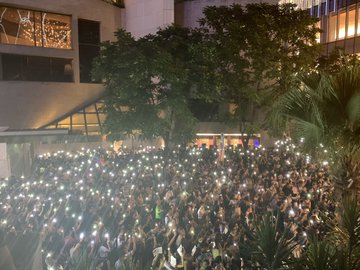
5,171
3:03 PM - Oct 14, 2019
Much of the intelligent analysis of populist uprisings in recent years has understood the central nature of autonomy to the appeal, right and left, of such anti-elite movements.
Hong Kong should be seen as part of this.
This is not just a student revolt.
It is not a class revolt.
It is a revolt on behalf of citizens demanding individual accountability.
They look to the lot of young people losing hope and the rise of suicide among those who see a loss to their freedom, and they want a path that is cordoned by the nostalgia for the past.
An upcoming election could prove significant in terms of the ability of the city to let off steam, but this is a long-term problem.
The people of Hong Kong see a government that is beholden to Beijing and the interests of the mainland, as opposed to responsive to its citizens.
They see a government that is pushing for cameras in the classrooms to monitor which students are wearing masks or all black in school, showing an affinity for the protesters.
They see the punishment for corporate leaders summoned to Beijing after expressions of solidarity with the protesters, and they fear that if the situation spirals further, significant crackdowns away from the cameras and protests could be the result.
The Hong Kong Human Rights and Diplomacy Act is scheduled for hearing in the House of Representatives this week.
The political freedom of Hong Kong depends on Beijing, and no act of Congress will change that. But the protest community is more hopeful, because they believe they are being heard — that by taking on this endeavor while their autonomy still hangs in the balance, before it is stolen away by the mainland, they can look to the economic freedom of Western business as a reason why all is not lost.
Others are less optimistic.
But when a fourth of your population demands something, there is a serious consequence when nothing happens — when millions of normal, law-abiding people feel their own autonomy, and the autonomy of their children, is at risk.
As one protester told me, with a smile: “We’re not afraid of tear gas anymore.”

Ray Chan
✔@ray_slowbeat
My colleague Roy Kwong has done his best to prevent tragedies & abuses. As butcher Carrie Lam's regime remains in power, sad events including the loss of life are bound to happen. This Gov't and its enablers must be made accountable for their fascist politics. #HongKongProtests

211
5:22 PM - Jun 15, 2019 · Hong Kong
After his death, Leung’s parents spoke out through a friend, urging on the young people of Hong Kong.
“Every brave citizen who takes to the street is doing so because they love Hong Kong deeply. Only by protecting themselves and staying alive can young people continue to speak up bravely against social injustices.”
The location Leung chose indicates the way the Hong Kong protesters cut across lines of culture and class.
While a “V for Vendetta” slogan is spray-painted a stone’s throw from where he hit the ground — “People shouldn’t be afraid of their government, governments should be afraid of their people” — this is no class uprising.
It is instead a broad cross-section of Hong Kong’s 7 million citizens who are joining in: blue and white collar, those of wealth and middle class, sons and daughters delaying their college education to join in.
At the luxuriant lounge in the JW Marriott, housed within the Pacific Place complex, about a hundred American dollars buys entry to a buffet of endless caviar, seared foie gras, lobster thermidor, fresh langoustines, mussels, crab legs, shrimp dumplings, lamb pops, roasted beef and pork, roasted squab, sushi, fruits and cheeses of all manner, four kinds of aged ham, three kinds of smoked salmon, bespoke Asian noodle dishes, and bottomless wine and champagne.
The tourists are mostly from the mainland: The men wear “Avengers” T-shirts and drawstring shorts with Nikes, while the women dress in shimmering summer blouses and flowing skirts with ankle boots.
Upper-middle-class people gorge while the middle class goes for an esteemed mother’s birthday.
She loves her gift of Italian perfume from the mega complex beneath us, five floors of an adult playground of shopping and excess that rivals any high-end American mega mall.
All the brands are there, though a group of college-aged girls express disappointed sounds outside the Celine store that is not yet open.
The doors are where you notice it first.
The heavy metal door hangings are bound in multiple ways, M-shaped locks paired with chains and padlocks, plus sandbags and interlocked metal barriers at other entrances.
It creates mazes where shoppers have to backtrack and ride the same escalator twice.
When you do the circuit, it’s easy to spot the choke points.
That’s where you’ll find men in suits who look tired and hold radios or have earbuds, wearing sunglasses, always watchful.
This is the same complex where just a few months ago, Leung would be the first death in a series of protests that would rock Hong Kong.
Over the course of the past 19 weeks, protesters have taken to the streets all over the city.
They have engaged in all manner of behavior.
Several of them have died, all reportedly by suicide.
Not all the protesters believe that’s the real reason.
But others claim the despair is so great among the youths of the city that suicide is very predictable.
When you talk to the people who are behind the democracy movement, to the protesters and the organizers and the organizer-adjacent, you can view the motives that have animated the streets for the past 19-plus weeks as existing within a broader context of conflict over autonomy and self-determination.
If you are a young Hong Konger, in your late 20s to early 30s, you remember the past before the handoff.
You are mindful of the years when Hong Kong had a higher degree of autonomy that would presumably be protected.
You see what you are losing in the current moment — and that’s what makes you take to the streets.
The current protests are being framed by the West as the first in Hong Kong in the era of comprehensive digital media and social communication that can bypass the restrictions of the state. That’s true to an extent — much of what’s happened in the past weeks here has focused on that audience.
But what separates this from the past, such as the Umbrella Revolution, is that the whole city is all in on this, existentially, regardless of class divide.
This despite the wishful thinking of the likes of Russia Today, the propaganda network of Vladimir Putin, which compared the protesters to classist uprisers from the film series “The Purge,” splicing clips together between the violent American movie and the acts of protesters in the city.
That level of deadly violence, as waged by the protesters, is absent, but there is violence nonetheless — petrol fire bombs, sharp objects, and vandalism abound.
Graffiti is omnipresent, but painted over lazily, as if the cleaners know that they will be back to do the same task again the next morning.
The city does not feel like a powder keg — more like a solid pot that looks safe and cool to the touch, but inside hides a roiling boil that will burn you in an instant.
Hawley’s Night with Hong Kong Protesters
The night one policeman’s neck was slashed, Sen. Josh Hawley, freshman Republican from Missouri, was in the streets with the protesters, bearing witness to their actions and the response of the police.
A white Kia emblazoned with graffiti, smashed and broken open with its contents spilled on the ground, was a short half-block from the main street.
According to protesters, the occupant inside had presented himself as a journalist, but was in reality a cop embedded within the movement.
Whether true or not, the protesters had exacted their revenge on his vehicle, cracking it open like an egg and feathering it with fliers and leaflets.
After a few minutes of press attention, clad in yellow jackets, streaming in a multitude of languages, holding up their various electronic devices in the spitting rain, came the sound of shouts that in any language reveal the the oncoming threat of Five-O.
“Be Water” is the mantra of the protesters now — a reference to their own Bruce Lee, who said, “Be like water making its way through cracks. Do not be assertive, but adjust to the object, and you shall find a way around or through it.”
Instead of seeking physical confrontation with the cops, now they flow away from the high ground in all directions, and regroup.
The cops roll in en masse, prompting a scurry of masked individuals from the scene.
They run in all directions as bus after bus unloads masked police officers, clad in armor and bulky gear, wielding large shields and bellowing orders.
They surround the scene and push back anyone in the area, blocking the nearby intersection.
They carry tear gas guns and batons, with no identifying badge numbers, and if you try to take their picture even of their glaring eyes, they unleash a torrent of epilepsy-inducing strobe lights.
Hawley, a slim athletic man who looks more like a health nut executive than a senator, loped through the cross streets, standing head and shoulders above the crowd, talking variously with protesters and with press, taking pictures on his own phone to share with the Western world.
His staff had to work to pull him away from the scene, even when the loudspeakers are ordering crowds to disperse.
The protesters and organizers know who Hawley is, and some even mention that he is the youngest senator.
It is a funny thing to hear Hong Kong twentysomethings with a greater knowledge of American civics than the average U.S. voter — especially when they query about subcommittee hearings and unanimous consent.
The interest of the protest-adjacent leadership is in the passage of the Hong Kong Human Rights and Democracy Act — authored originally by Marco Rubio, with more than 30 bipartisan co-sponsors.
Whether it would result in meaningful impact on Hong Kong’s situation or not, it would be a signal to Hong Kong and Beijing and other nations as well about the way these protests are perceived.
An older woman, unmasked and barefoot, wearing a flowery orange and pink dress, stands on the corner of the intersection, letting the police have it.
A call and response develops between the different corners as members of the press crowd around the woman.
The protesters are not throwing anything at the police or engaging in physical action, but they are daring them to do what they have seen them do for weeks: to beat the citizens they are supposed to protect, not for doing anything wrong, but for the things they dare to say.
Everyone is waiting for something to break.
This time, the cops hold back.
They know the next 24 hours will potentially bring an even bigger demonstration, and don’t want to make another martyr on the eve of a public spectacle.
They set about clearing the makeshift barricade protesters had arranged — a rather impressive mix of trash cans, traffic signs, concrete, and rebar.
Well-dressed shopkeepers along the main drag peer through metal slats they bring down whenever the sirens draw near.
In between the stores and shops, the graffiti blanketing wooden barriers alternates between Cantonese and English, expressing all manner of viewpoints — but all anti-cop.
Some words indicated the cops were working hand in glove with the local Triads criminal operation, something that has been accused multiple times.
Others focused more blatantly on the mainland, including one saying, “Pooh is watching,” Winnie the Pooh being a stand-in for Dictator Xi.
Recently, a particularly enterprising protester set up a broadcast allowing for the “South Park” episode “Band in China” featuring just that reference to be displayed after it was, well, banned in China.
These are the types of tactics these young, technologically adept and passionate protesters are engaged in.
A strobe light from an anonymous cop’s shoulder doesn’t really stand a chance against it.
In the morning, Hawley will describe the scene in Hong Kong to the Western press as a “police state” — prompting Hong Kong’s chief politician Carrie Lam to disagree.
It is hard to see how he is wrong.

Josh Hawley
✔@HawleyMO
I chose the words “police state” purposely - because that is exactly what Hong Kong is becoming. I saw it myself. If Carrie Lam wants to demonstrate otherwise, here’s an idea: resign https://twitter.com/tictoc/status/1183935160707764225 …
Bloomberg TicToc
✔@tictoc

 "To describe Hong Kong as a police state is totally unfounded."
"To describe Hong Kong as a police state is totally unfounded."Leader Carrie Lam says U.S. senators visiting Hong Kong have preconceived views about the city. Senators Josh Hawley, Ted Cruz and Rick Scott have visited the city since the #HongKongProtests #香港

23.7K
5:31 AM - Oct 15, 2019
American Response and Corporate Censorship
In recent weeks, this story took on new life in America and the West thanks to some odd flashpoints. For America, much of it was focused on the issue of the National Basketball Association.
The NBA has an extreme foothold here — 17 percent of its revenue comes from China, and it had the misfortune this month to discover that this Hong Kong issue was creeping into the overall tour that was going on promoting the basketball association in China, featuring some of its biggest stars.
After Houston Rockets general manager Daryl Morey had the audacity to retweet an image meme supporting freedom in Hong Kong, the Chinese flipped, and Americans flipped even more when they saw how quickly various "woke" athletes and administrators in the NBA, who have made politics a centerpiece of their appeal in recent years, were willing to bend the knee to the Chinese communists.
The most recent was LeBron James, whose cowardly comments trended on Twitter hours after the massive protests took over Hong Kong streets again.
James called for Morey to educate himself.
Well, we’re all in need of a good re-education, from time to time.

Ben Domenech
✔@bdomenech
This was the Top Tweet I saw as I switched from my burner after three days in Hong Kong among the protesters.
Look into the eyes of a young Hong Konger who has seen her friends beaten and imprisoned and spout this bullshit.
I have never hated LeBron until this instant. https://twitter.com/BenGolliver/status/1183917743680020480 …
Ben Golliver
✔@BenGolliver
Lakers’ LeBron James on NBA’s China controversy: “I don’t want to get into a ... feud with Daryl Morey but I believe he wasn’t educated on the situation at hand and he spoke.”

5,592
5:15 AM - Oct 15, 2019
In the category of video games, an outburst from a gamer within the Blizzard universe led to crackdowns and apologies that rocketed around a world of advanced E-gamers who have become far more popular than ever before, even rivaling great physical athletes.
Protesters also saw the bending of the knee from other corporations, such as Apple, which deleted the HKmap.live app being used by some protesters to track the activities of police in Hong Kong.
But it was hardly their only app.
In Hong Kong, it’s understood that not everyone can take the black or wear a mask.
For their part, the white-collar protesters are doing their best to hide.
They are canceling their own social media accounts.
They are trying to prevent themselves from being connected to their businesses for any political expressions.
They are worried about the accountability and the enforcement mechanisms used by authoritarian regimes that can control the access to billions of potential customers.
But they still are showing up to the protests, such as those on Monday that clogged the streets with peaceful demonstrators.
Meanwhile, the police union has asked for permission to fire at will on protesters who use various implements:
Authorities have already loosened guidelines on the use of force by police, according to documents seen by Reuters on Thursday, as they struggle to stamp out anti-government protests that have rocked Hong Kong for nearly four months.
The loosening of restrictions on the use of force by police came into effect just before some of the most violent turmoil yet at protests on Tuesday, when a teenaged secondary school student was shot by an officer in the chest and wounded — the first time a demonstrator had been hit by live fire. …
Local media Now TV and Cable TV reported the changes to the police procedures manual took effect on Sept. 30, the day before Tuesday’s violence at widespread protests on China’s National Day, during which the student was shot. …
The updated guidelines also removed a line that said “officers will be accountable for their own actions”, stating only that “officers on the ground should exercise their own discretion to determine what level of force is justified in a given situation”.
Police have shot one protester already with live ammunition.
The protesters expect there will be more.
On the mainland, the focus has been on economic policy and welfare, and Carrie Lam would like to stick to that.
But in reality, these protests are about a lot more than that.
They are about the future of a Hong Kong that many people see as slipping away, one that young people in particular fear they are losing.
The protests started with concerns that the extradition law would mean the end of Hong Kong as they know it.
Now, it’s about something much bigger.
After multiple incidents where the cops are seen as having whitewashed the facts, they have lost the assumption among the citizenry that they are telling the truth.
Already, political activists are fleeing to other countries.
Elderly groups who attempt to protect the children have already incited police incidents.
Religious freedom concerns are rising, particularly about the Chinese state wanting to set up boards to infiltrate and alter those assumptions of religious schools.
The crackdown on free internet is constantly feared.
A government official who was asked about this on the radio recently was quoted as saying, “Never say never.”
This Hong Kong Protest Is Different From the Past
This is not the first era of protest in Hong Kong since the handover in 1997.
Previous protests, such as the Umbrella Revolution, were overwhelmingly peaceful, but there is now a feeling that a peaceful approach has not been effective, particularly in an era in which police appear ready to engage in escalating levels of violence.
For years, pro-democracy advocates who feared that Beijing would crack down on the city system they know and love restrained themselves, participating almost exclusively in nonviolent protest. They would march with permits, organize under the existing law, and generally not buck the system they inhabit.
This feels different.
Joshua Wong, a student activist who was at the center of both Umbrella and other protests in the past, who was standing in jail when he saw the nearly 2 million people come out to protest peacefully in the streets back in July, is concerned that this is a moment in which Hong Kong could see its autonomy seriously slip away, based not just on its own situation but on the international priorities of Dictator Xi.
These are the sorts of concerns echoed by Texas Sen. Ted Cruz.
Wearing all black in sympathy for the protesters, he visited key figures in Hong Kong this past week and spoke to the West on “Face the Nation.”
A spokesman for Beijing reportedly said he would no longer be welcome in Hong Kong, something which Cruz may be likely to test in the future.
The use of excessive force is an underlying element of all of the protesters’ complaints.
Police remove gas masks from protesters who are trying to resist the tear gas the officers throw.
They use water cannons, tear gas, and rubber bullets.
They take gas masks even off journalists, and they arbitrarily arrest bystanders.
During the Umbrella protests, there were only eight arrests of cops for use of excessive force, stemming from two incidents.
And according to protester counts, in the past four months, the police in Hong Kong have deployed 3,000 gas canisters, compared to 89 during the entirety of the Umbrella protests.
The establishment on the island, made up of both politicians and tycoons who work within the financial sector, have largely favored what Beijing and the mainland has favored in recent years.
But the threat of an extradition law that would have rolled back the authority of Hong Kong to adjudicate criminal matters regarding its citizens proved a bridge too far.
Not wanting to displease the political authorities but wanting to maintain their authority, a few of these corporate citizens have broken from the rest of the herd.
Mainland China is not interested in such breakage.
It is demanding more and more the kind of fealty one would expect from an authoritarian regime.
Hong Kong Protesters Have Big Demands
The protesters have five demands — a series of issues they want to be at the centerpiece of the conversation over the next week as the Legislative Council meets for the first time since these protests began.
Carrie Lam, under siege politically and facing falling popularity, is set to give an agenda-setting speech, though it’s unclear whether security concerns will allow her to give it in person.
The mask ban is a key point of dispute here.
It attracted international attention recently, designed to crack down on the ability of protesters to keep their identities secret.
It was not a legislative action, but an executive one — a step undertaken outside the process.
Protesters fear it is a sign of what will come.
Rather than being motivated by independence, the protesters in Hong Kong are focused on the issue of autonomy — a form of autonomy they have experienced for decades.
They see within the expansion of Xi Jinping’s power the threat to that existence and to the one country, two systems approach.
These protests are more connected to other populist movements around the world, of the past and the present, than external observers have acknowledged.
It took over a year of open combat before the Americans gave up on their original aim of self-governance under the crown and went for independence in the 1700s.
Radicalization takes time, but when it comes, it comes in a torrent.
All around the world, people are tired of being governed by leaders who do not care how they vote. Hong Kong is joining them in this.
The possibility that the Hong Kong authorities will use colonial powers to suspend habeas corpus, defy the public will, and crack down in violent fashion on these protests is very real.
Wong predicts that protests will continue, regardless of what is done when the Legislative Council meets or when elections are held.
The fear is that Hong Kong is being turned into a police state beholden to Beijing, where these crackdowns are viewed as necessary to keep up appearances to the outside world.
But that is harder in an era of ever-present smartphones.
Beijing is primarily focused on containment.
It does not want to see the kind of protest happening in Hong Kong spread to other key cities under its regime, but there are other schools of thought as well.
If Beijing does let the unrest fester, it could be because Beijing sees the potential lesson for other citizens: Protests damage the economy, and it can say to others on the mainland, “See what happens when you want freedom and sovereignty?”
At the moment, it is mostly the mid-tier industries affected by these protests, tourism and the like. This is a real problem.
The malls are half-filled with the types of people who normally shop there.
New deals only do so much to offset the ever-present reminders.
What the protesters are demanding is big.
For one, universal suffrage: In the current system the powers that be, anointed by Beijing, are the ones who pick the candidates people can vote on.
Real universal suffrage would include the people’s ability to pick their own candidates for key positions.
For another, the rejection of the label “rioters,” one that carries with it a 10-year potential imprisonment.
And it is unlikely any of the protests will dissipate absent an independent commission looking into the police response.
For big demands like this, the peaceful protests of the past did not result in the kind of changes they wanted to achieve.
In July, almost a quarter of the island’s population came out to peacefully protest, and while that led to Carrie Lam’s decision to pull the extradition bill back, it did not lead to the kind of shifts those protesters really wanted to see, ones that would clearly indicate that the powerful had heard the complaints of the island citizenry over the encroaching reach of the mainland.
Instead, protesters are left to appeal to the international community.
Some are even hoping for the direction of sanctions under the Magnitsky Act, including severe economic sanctions against those found to have engaged in human rights abuses, freezing or seizing their assets and canceling their family visas to the West.
As the danger to autonomy increases, the response from Hong Kong’s citizenry becomes more strict and more aggressive.
The differences between past protests are clear.
This one is leaderless.
Leaderless movements are better, the protesters tell me, because they cannot be shut down just by arresting one person.
The protesters who have engaged in more violent activity, including the throwing of petrol bombs and the like, damaging property, and setting up barricades, have been branded by the media as radical. But the protest activists call them brave.
This is a matter the activists believe has been an increasing problem for the police force in Hong Kong.
The cops hide their badge numbers and their faces so they cannot be identified, and so even when protesters attempt to report the kind of brutality they readily experienced and for which there is a significant amount of video and photographic evidence, there is no way to attach those complaints to an actual officer.
Protesters say this is the worst they’ve ever seen it, that the government tactics are escalating.
They now risk violence eagerly and say the police complaint mechanism is broken, where anonymity prevents any useful accountability.
Protests are now being routinely redefined as inherently unlawful, where no permission is granted for the kind of peaceful exhibitions that had existed in the past, so there is no incentive to organize peacefully.
The police have lost credibility, and Hong Kong now has no safety valve.
In response, some within the protest movement have engaged in mob violence.
“Take care of it ourselves” is the mantra, including vigilante justice against those individuals the mob believes have engaged in behavior that hurts their cause.
Protesters Aren’t Giving Up
The Hong Kongers took the streets again on Monday night, with a specific focus on U.S. policy. There were hundreds of thousands of them, surrounding buildings, raising flags, singing songs.
There was no violence.
They were happy and optimistic, uninterested in violence.
They were trying to send a message.

Jessie Pang@JessiePang0125
Thousands of protesters rallied on Monday night to call for the support on the HK Human Rights and Democracy Act. It is also the first rally that obtained non-objection letter from the police since the #AntiMaskLaw is implemented. Yet, many still wear their masks tonight.




5,171
3:03 PM - Oct 14, 2019
Much of the intelligent analysis of populist uprisings in recent years has understood the central nature of autonomy to the appeal, right and left, of such anti-elite movements.
Hong Kong should be seen as part of this.
This is not just a student revolt.
It is not a class revolt.
It is a revolt on behalf of citizens demanding individual accountability.
They look to the lot of young people losing hope and the rise of suicide among those who see a loss to their freedom, and they want a path that is cordoned by the nostalgia for the past.
An upcoming election could prove significant in terms of the ability of the city to let off steam, but this is a long-term problem.
The people of Hong Kong see a government that is beholden to Beijing and the interests of the mainland, as opposed to responsive to its citizens.
They see a government that is pushing for cameras in the classrooms to monitor which students are wearing masks or all black in school, showing an affinity for the protesters.
They see the punishment for corporate leaders summoned to Beijing after expressions of solidarity with the protesters, and they fear that if the situation spirals further, significant crackdowns away from the cameras and protests could be the result.
The Hong Kong Human Rights and Diplomacy Act is scheduled for hearing in the House of Representatives this week.
The political freedom of Hong Kong depends on Beijing, and no act of Congress will change that. But the protest community is more hopeful, because they believe they are being heard — that by taking on this endeavor while their autonomy still hangs in the balance, before it is stolen away by the mainland, they can look to the economic freedom of Western business as a reason why all is not lost.
Others are less optimistic.
But when a fourth of your population demands something, there is a serious consequence when nothing happens — when millions of normal, law-abiding people feel their own autonomy, and the autonomy of their children, is at risk.
As one protester told me, with a smile: “We’re not afraid of tear gas anymore.”
